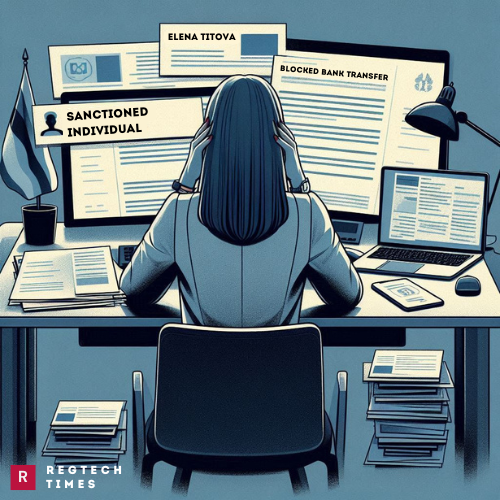Imagine being a person with the same name as someone who is on an international sanctions list. This is the reality for Elena Titova, a woman from Vilnius, Lithuania. Over the past two years, Elena Titova has faced serious problems because her name matches that of another woman from Belarus. The other Elena Titova is on a sanctions list, which is a set of rules that restricts certain people from doing business or financial transactions.
The Confusing Identity Crisis for Elena Titova
Elena Titova first learned about her name twin when she tried to make a simple bank transfer. She was surprised to find out that there was another person with the same first and last name as hers. The other Elena Titova is associated with sanctions, which means banks and financial institutions have to be extra careful when dealing with her name.
Every time Elena Titova wants to send money to someone, she often hears, “Sorry, but we can’t process this transfer.” This happens because the person receiving the money gets a message from their bank saying that the transfer might be linked to someone on the sanctions list. Imagine how frustrating this is!
Elena Titova recalls one particular instance when a person she sent money to was told he could not receive the transfer unless he provided proof that she was not the person on the sanctions list. “I was told by a person to whom I made a bank transfer that he received an email from his bank saying that he would not get the money because my name is possibly on a sanctions list,” she explained.
This situation led to ridiculous requests. Sometimes, the recipient of Elena Titova’s money has to send a copy of her ID or documents showing her date of birth and nationality just to confirm that she is not the other Elena Titova. “I am most angry that someone else has to send my ID,” she said. “Because I do not always transfer money to a friend, a family member, or an acquaintance. Sometimes it’s a stranger.”
Banking Woes and Missed Payments
The confusion doesn’t just affect Elena Titova’s bank transfers. She has had trouble receiving payments as well. Once, her salary was stopped because of this mix-up. She remembers the moment vividly, saying, “One time my salary payment was stopped, I had to call my company’s accounts, and they had to sort out the situation.” This incident not only caused stress for Elena Titova but also wasted the time of her employer’s accounting department.
Belarusian Fertilizers Breach Sanctions and Undermine Ukraine’s Agricultural Security
Banks in Lithuania have rules they need to follow when it comes to sanctions. The Bank of Lithuania explained that each bank can decide how to handle situations involving sanctioned individuals. If a name is not enough to confirm that a person is not sanctioned, banks will ask for additional information. This can mean delays and complications for innocent people like Elena Titova.
Legal Perspectives and Consumer Rights
Experts have different opinions on this issue. Stasys Drazdauskas, a law lecturer at Vilnius University, believes that the inconvenience Elena Titova is facing is a necessary trade-off for public safety. He argues that the reasons for sanctions, which involve keeping society safe and secure, are more important than individual troubles. According to him, the information banks request, like date of birth and nationality, is not highly sensitive. “With them, identity theft is not so easy to do,” he says, pointing out that such details alone cannot easily lead to a person’s identity being stolen.
On the other hand, Rytis Jokubauskas, vice president of the Consumer Alliance, disagrees with Drazdauskas. He warns that even seemingly harmless information can lead to trouble. “Any such additional data leak helps to complete the portrait of the person and increases the likelihood that the data of that person will be used for malicious purposes,” he explains. Jokubauskas believes that banks are not doing enough to protect their customers from such situations. He states, “It is clear that the procedures used by banks are not worked out; they’re not what they should be.”
Elena Titova’s ongoing issues are a clear example of how important it is for banks to have proper procedures in place. Jokubauskas insists that banks need to find better solutions to handle situations like Elena Titova’s.
In response to these troubles, Elena Titova plans to take action. She intends to file complaints with both the Bank of Lithuania and the State Data Protection Inspectorate. She hopes that by bringing attention to her case, changes will happen to help her and others in similar situations.


